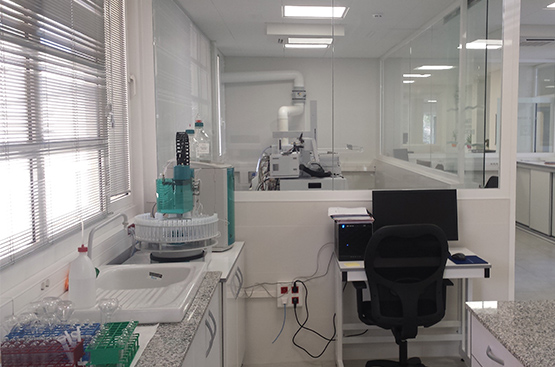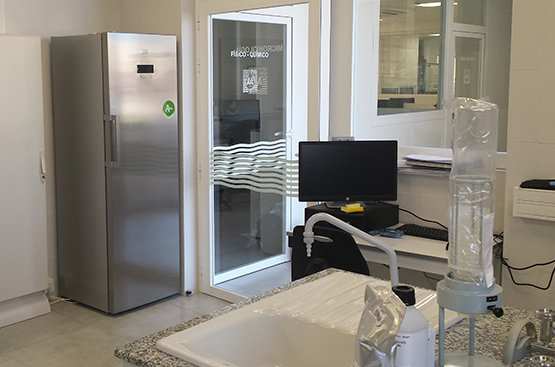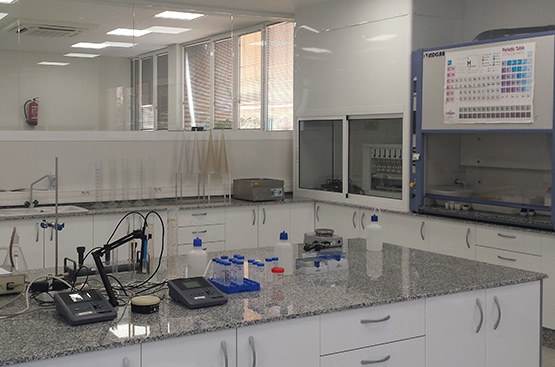El laboratorio de Aguas de Alicante
Aguas de Alicante cuenta con un laboratorio propio para el análisis de las aguas del ciclo integral de los municipios que gestiona, y está dotado con un equipo humano altamente cualificado y con amplia experiencia, que unido a la tecnología más avanzada permite cumplir satisfactoriamente con los requerimientos y exigencias técnicas y de calidad establecidos por diversas legislaciones vigentes en materia de aguas, lodos, sedimentos y residuos.
En este laboratorio se realizan a lo largo del año más de 50.000 determinaciones analíticas, lo que supone procesar y analizar más de 10.000 muestras (considerando todo tipo de matrices, es decir, aguas potables, residuales, regeneradas, residuos, vertidos industriales, sedimentos, lodos y lixiviados.
En el laboratorio de Aguas de Alicante se pueden llevar a cabo:
- Análisis Físico-Químicos: aniones, cationes, compuestos orgánicos volátiles y semivolátiles, plaguicidas, trihalometanos, metales, hidrocarburos, etc..
- Análisis microbiológicos: indicadores de contaminación fecal, Salmonella, Vibrio cholerae, Staphylococcus aureus, Pseudomonas aeruginosa, Legionella, nematodos, intestinales, protozoos, bacterias filamentosas, algas, etc.
La calidad de las aguas de consumo humano está regulada en todos los países de la UE por una misma normativa común, la Directiva 98/83/CE; esta normativa toma como base las recomendaciones de la Organización Mundial de la Salud (OMS) y se articula en el estado español a través del Real Decreto 140/2003; este Decreto establece el control de 53 parámetros diferentes, y Aguas de Alicante lleva a cabo todos estos controles en su laboratorio, cumpliendo así con todos los requerimientos de la legislación, para que el agua sea totalmente segura para el consumo humano.
Las muestras de agua de las diferentes instalaciones de Aguas de Alicante (pozos, depósitos, redes de distribución, grifo de los consumidores, etc.) se analizan a diario en su laboratorio con la finalidad de garantizar que el agua cumple todos los requerimientos legales y ofrece la máxima seguridad para su consumo.
El laboratorio tiene implantado un sistema de calidad que afecta a todos sus ámbitos, tal y como se refleja en los reconocimientos y acreditaciones relacionados:
- Laboratorio de análisis registrado en el “CENSO NACIONAL DE LABORATORIOS DE CONTROL DE CALIDAD DEL AGUA DE CONSUMO HUMANO DEL MINISTERIO DE SANIDAD, SERVICIO SOLCIALES E IGUALDAD”
- Laboratorio análisis de aguas de consumo humano registrado en la “CONSELLERÍA DE SANIDAD UNIVERSAL Y SALUD PÚBLICA·DE LA GENERALITAT VALENCIANA”.
- Laboratorio en disposición del certificado por la UNE-EN ISO 9001 exigido en el Real Decreto 140/2003 por el que se establecen los criterios higiénico-sanitarios de las agua de consumo.
- Laboratorio acreditado por la UNE-EN-ISO 17025 para análisis de laboratorio; máxima acreditación para Laboratorios de Ensayos a nivel internacional, otorgada por la Entidad Nacional de Acreditación española
-
Instalaciones
Las instalaciones del laboratorio, con alrededor de 500 m² de extensión, están repartidas en cuatro zonas bien diferenciadas:
- Área de Recepción y Gestión de Muestras (Aguas Potables y Agua Residuales)
- Sección de Análisis Físico-Químicos (con la tecnología más avanzada y de última generación en Espectrofotometría y Cromatografía de gases).
- Sección de Análisis de Aguas Residuales, en la que también se lleva a cabo los controles del proceso de las estaciones depuradores.
- Sección de Análisis Microbiológico
La dotación de este nuevo laboratorio de Aguas de Alicante nace por la motivación de la compañía en progresar para dar cada día, un mejor servicio a la ciudad de Alicante. Por otro lado, gracias al laboratorio se consigue dar una respuesta temprana ante problemas que pudieran surgir con la calidad del agua suministrada al disponer de una información global, inmediata y centralizada.
-
Equipo humano
Nuestro laboratorio cuenta con grandes profesionales altamente cualificados con amplia experiencia en temas relacionados con el análisis de aguas y otras matrices ambientales. Todo el personal está en continua formación interna y externa gracias a los planes de formación que Aguas de Alicante ofrece anualmente a sus trabajadores en relación a todas estas áreas de interés.
Es un equipo multidisciplinar de expertos altamente preparados, compuesto por profesionales de distintos grados académicos. En concreto se dispone de:
- Doctores en Ciencias Químicas y Biología
- Licenciados en Farmacia, CC.Químicas y CC.Ambientales
- Técnicos de Grado Superior (CC. Ambientales)
- Técnicos de Grado Medio (FP)
- Personal operario especializado en las tomas de muestras



